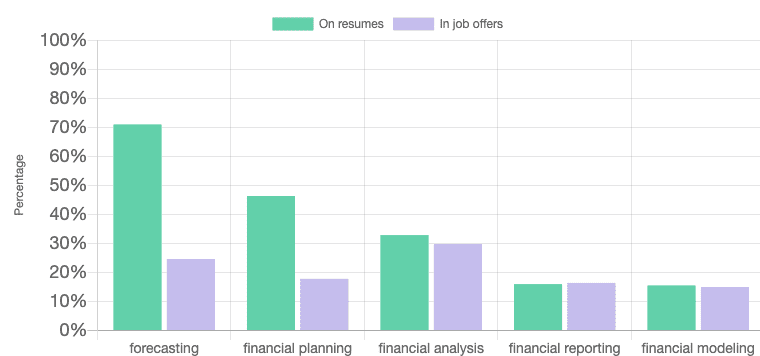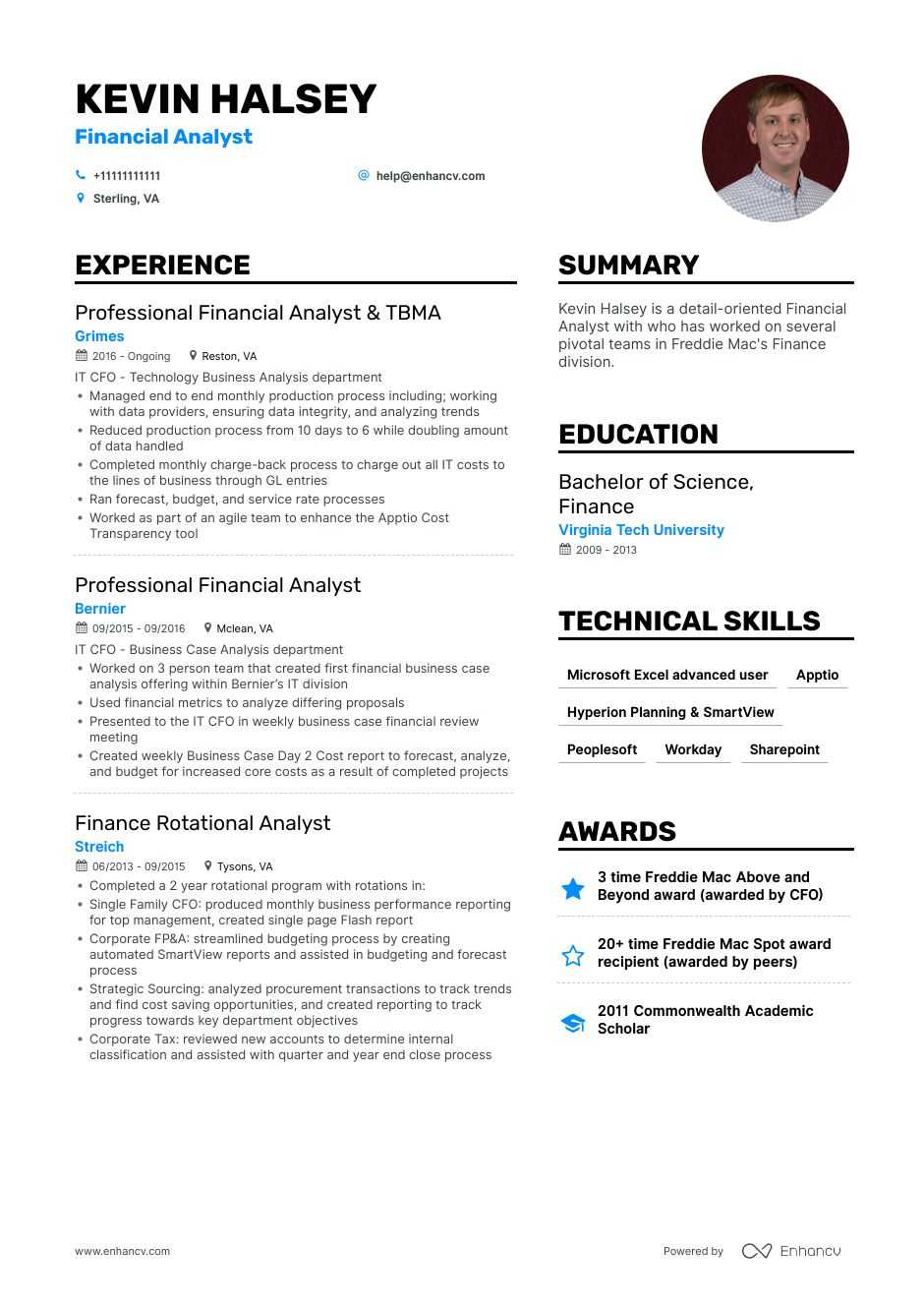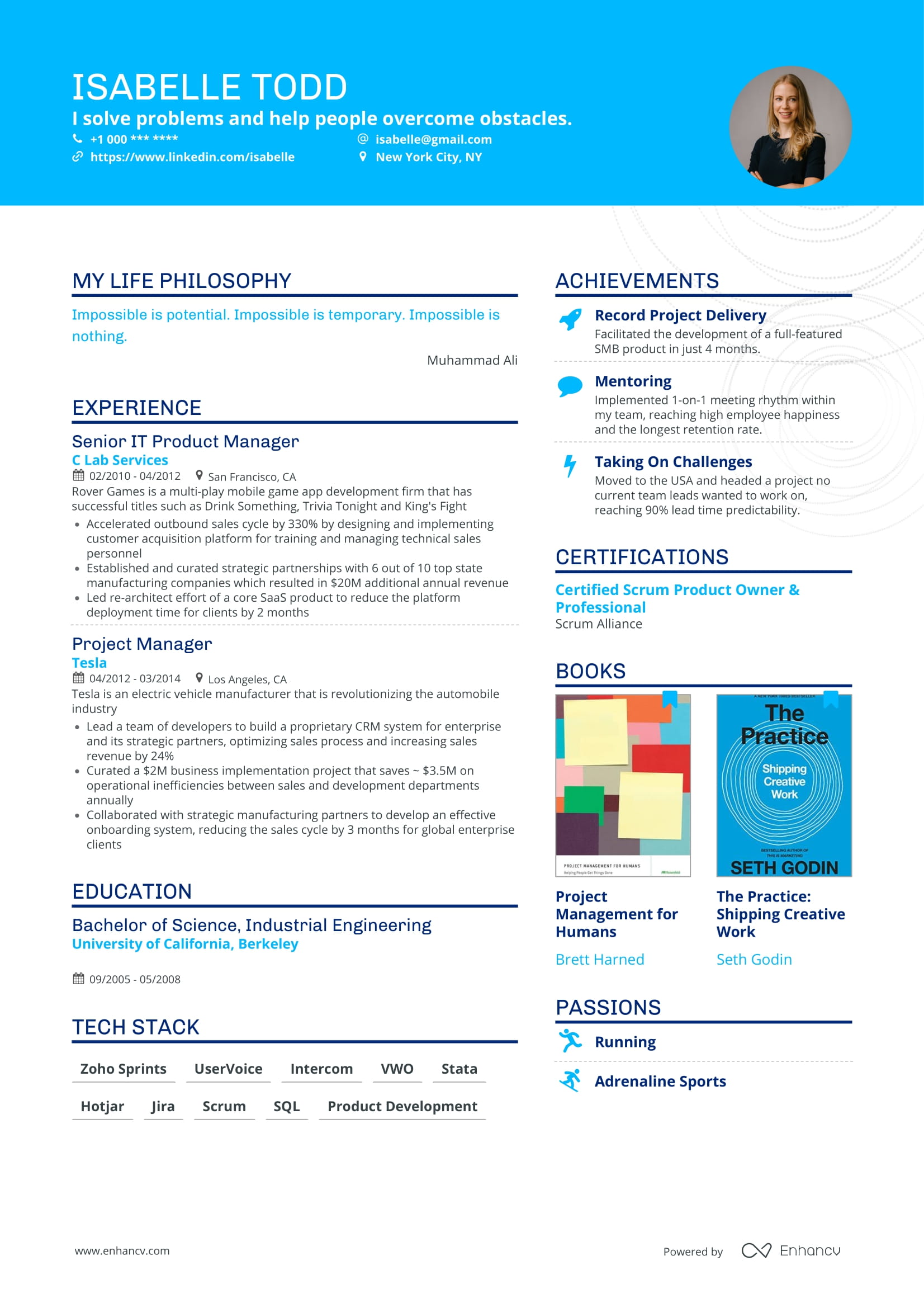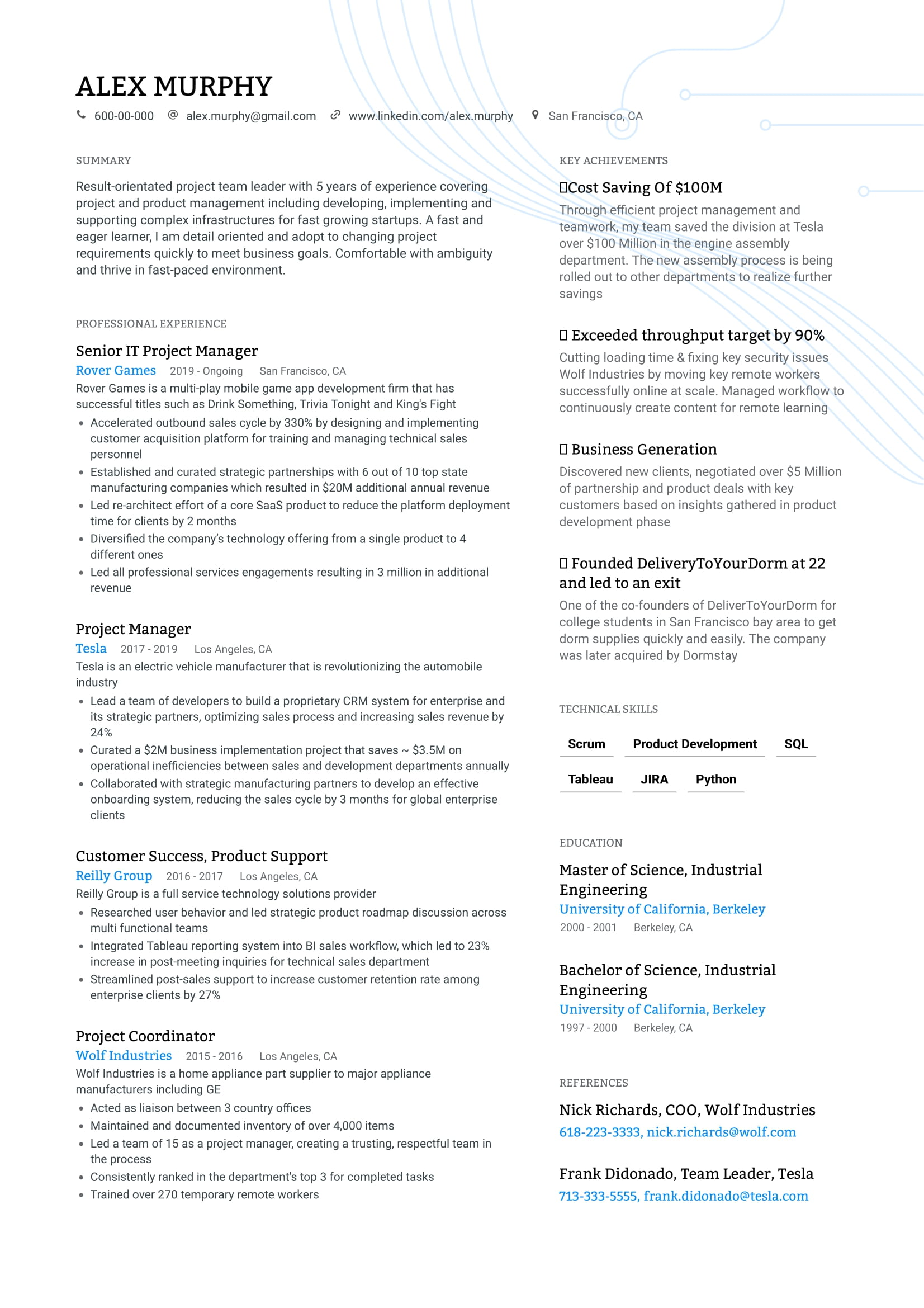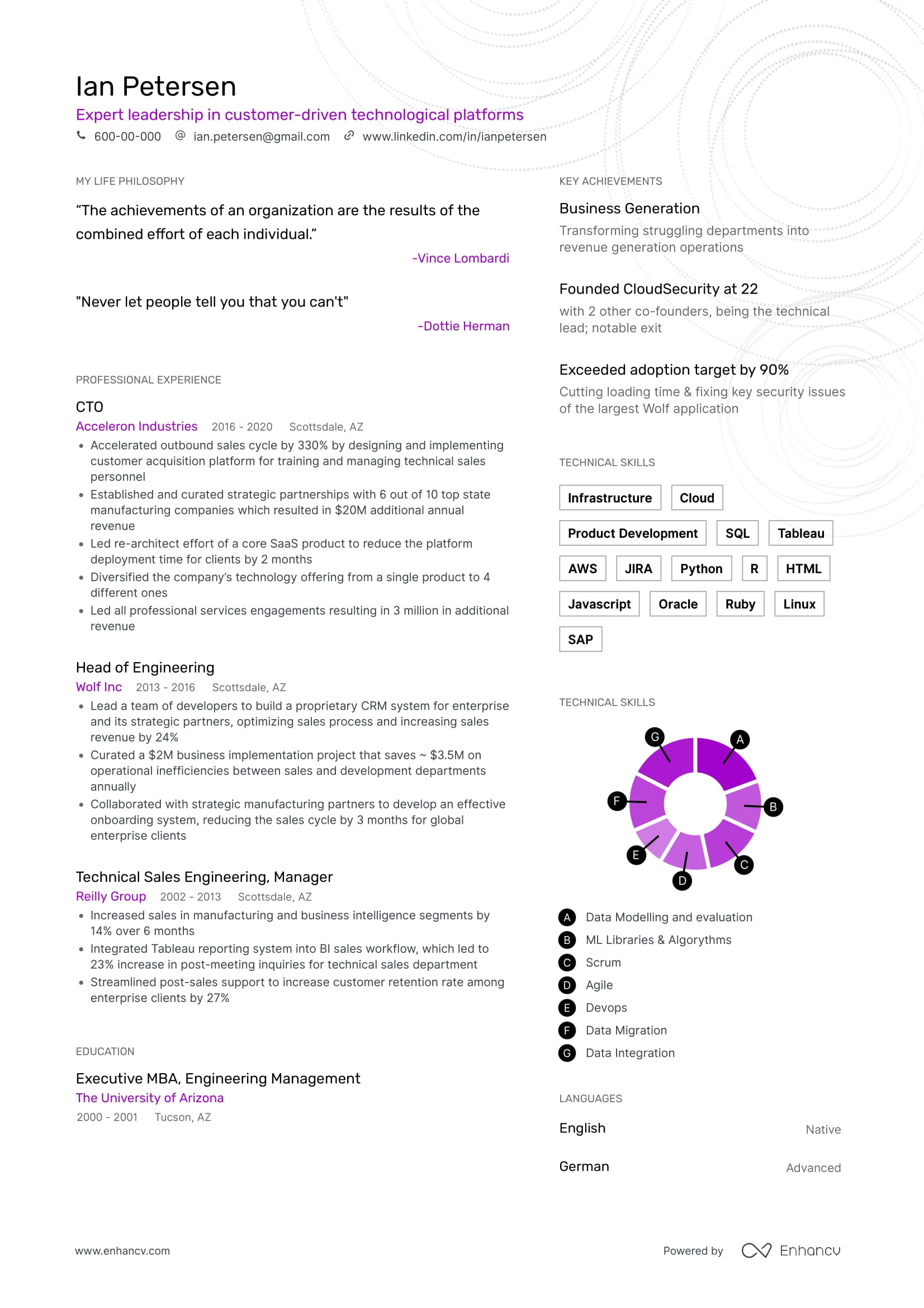Example Financial Analyst Resume - Browse more resume templates and build a stand-out resume
You’re a financial analyst, but that doesn’t mean your financial analyst resume should look as dull as a spreadsheet.
You’ve probably heard the standard wisdom that you need to stick to the “standard” form.
But that’s only going to get you sub-standard results.
To really stand out and get the financial analyst job you want, your resume needs to be better than the rest.
Here’s a financial analyst resume sample & how to use our resume builder
In this guide you’ll learn how to create a financial analyst resume:
✔ Choose an appropriate financial analyst resume template for your experience level
✔ Include financial analyst skills that reflect the job description
✔ Pay special attention to crafting a financial analyst resume summary or objective
✔ Even an entry level financial analyst resume can (and should) showcase relevant skills
✔ Senior financial analyst resumes need to include experience which showcases relevant skills
Looking for related resumes?
- Accounting Resume
- Business Analyst Resume
- Bank Teller Resume
- Bookkeeper Resume
- Auditor Resume
- Finance Resume
- Portfolio Manager Resume
- CFO Resume
- Investment Banking Analyst Resume
- Banking Resume
How to create the best resume outline
Just like an essay, it helps to start your resume by mapping out what sections you’ll need.
Here’s the most common financial analyst resume outline:
- Objective
- Financial Experience
- Education
- Soft Skills
- Technical skills
- Interests
- References
Of course your resume might vary. Consider where your strengths lay and what information you want to get across to the reader first. For example while elements of your personality might be interesting, a hiring manager for a financial analyst job wants to see your finance experience first.
Choose the resume layout that will work best for your financial analyst resume
Before someone reads a single line of text from your resume, they’ll notice the layout and template.
So choose a template that sends the right message for you.
- Basic layout - this single column template is ideal for someone looking to get hired as an entry level financial analyst. If you don’t have a ton of experience for your resume, this presents that so it’s incredibly easy to read and doesn’t look light.
- Professional layout - use this template if you’re applying for a big corporation like Lufthansa, or one of the big four companies. Finance is one of the most conservative industries, people are going in suits, so especially in those companies it’s good to use a professional financial analyst resume layout.
- Simple layout - applying to a company that you don’t know much and you don’t want to risk getting rejected? Than this layout can work best for you.
- Creative layout - you’re not the typical financial analyst? Or you’re applying for a financial job in a young startup. Than you should consider using something more colourful with more personal sections.
Here’s what to consider when choosing the perfect financial analyst resume layout:
- Be sure it presents your relevant finance qualifications clearly
- It should place your most important financial information at the top
- It should be easy to read and catch your eye
- It should work with ATS (Applicant Tracking Systems)
- Be sure to send it as a PDF
Get these elements right and you’ll have recruiters delighted at how easy you’ve made their job.
Your information was clear, easy to read, pleasing to the eye, and matched the job description.
You made yourself a “no brainer.”
How to create the best resume header for a financial analyst
The CFO, hiring manager, or fellow financial analyst reviewing your resume doesn’t have a lot of time to review it. There are thousands of applications for most financial analyst jobs, you need to stand out fast.
A financial analyst resume header should have:
- Your name - include next to it if you have the following certificates - CFA, CPA, etc. This way the HRs can see in the first seconds that you’re qualified enough. Even if you’re in the process of taking them, consider adding “CFA candidate” for example, after your name.
- Your financial resume title - you’ve worked in big four before or you’ve graduated top financial university? Add these to your resume title
- Your linkedin profile - well this is the social network for most of the financial people out there. Adding facebook or twitter will make other financial people wonder when looking at your resume.
Put yourself in the shoes of the person reading your resume and consider the message your header is giving
How to write a financial analyst resume objective or summary
You created the perfect resume header.
Now you’ve got their attention, they want to read a bit more about who you are.
That’s where an objective or summary is important.
It lets them skip over everything and get a quick idea of who you are and what your goal is.
For example:
The problem? It doesn’t tell the reader anything very useful. It’s also not specific to the position, it reads as generic.
Or, for an entry level financial analyst:
What makes the difference?
A financial analyst resume objective should
- Be specific
- Express your short and long-term career goals
- Say something about who you are and what you’re good at
- Be addressed to the specific job you’re applying for
How to make your financial analyst experience more effective on your resume
Let’s say you’re up against one other person for a job.
You’ve got the better experience, but they know how to present it better than you do.
Guess who’s getting hired?
For better or worse, the way you present your financial analyst experience is tremendously important.
Have a look at these examples to see what we mean.
Financial Analyst Resume Experience Examples
While it’s not always possible to provide exact metrics of how you impacted some areas, you can see how this experience example mentions specifics whenever possible.
Notice how lifeless and generic that second example is? Hiring managers certainly will notice.
Beyond telling them what type of work you did, it gives them no real sense of whether you were successful or what you accomplished.
You could have done a terrible job or an excellent job and this experience section could look identical.
So, if someone reads that section, they feel like you just wasted their time making them read something that gave them almost no new information.
What if you need to create an entry level financial analyst resume experience section?
While anyone looking for a financial analyst position is going to have some background in the field, what should you do if you’re a recent graduate and don’t have much relevant experience?
The good news is, there are lots of ways to show you can work well under pressure, be effective on a team, or analyze metrics. This experience could come from an internship, a side project, an organization you volunteer for, etc.
Here’s what you should do:
- Start by identifying the kinds of skills and experiences you think will be relevant for the financial analyst job you’re applying for. Let’s say it wants someone who works well in a small team.
- Now, look back at your previous experiences to see what you may have done which could demonstrate that. In this example, maybe you worked on finance projects with small groups in university.
- Once you’ve got the right experience, emphasize it using the same language the job description did.
With these techniques, even if you’ve never had a job as a financial analyst, you can still show you’re qualified for your first position.
Of course, if you’re creating an entry level financial analyst resume, your education section is of particular importance.
How to create a better financial analyst resume education section
While senior financial analysts shouldn’t devote as much space to their education (just a listing of where you want, your degrees, etc. should be sufficient), younger analysts need this section to make an impression.
Here’s what you can add to your education section:
- Relevant courses (here you can mention projects, skills acquired, lessons learned, etc.)
- Awards
- Your GPA (if you think it’s relevant)
- All of the regular information mentioned above
Here you can find a more senior financial analyst education section example:
Here is an entry level financial analyst education section example:
What skills should you include on your financial analyst resume?
There are two basic approaches to including your skills. The way you go about it will depend on whether you’re describing technical or soft skills.
Let’s break down the difference and how to do each one the best way.
How to include technical skills on a financial analyst resume
This works best for skills that are binary and straightforward. In this case, it’s used to list software.
You’re either familiar with the software or you’re not. There isn’t really a need to elaborate beyond that.
This kind of a skills section is important because many ATS (Applicant Tracking Systems) will screen your resume for certain keywords before a human ever sees it). A simple list of relevant technical skills required in the job description does the job perfectly.
The top financial analyst resume technical skills
- Bloomberg
- Sharepoint
- SAS
- MATLAB
- Access
- GoCatalant
- Spotfire
- QlikView
- Peoplesoft or relevant General Ledger SW
- Workday
- GLG Strategic Projects
- Branko
- Microsoft Excel
- Hyperion Planning & Smartview
- Toptal
- Tableau
How to include soft skills on a financial analyst resume
Soft skills work quite differently. If you simply list them the way you would technical skills, it comes of as lazy and not very credible.
In other words, don’t do it.
It’s always going to be more effective to show that you have a soft skills by giving an example rather than simply stating that you have it.
That said, if the job description asks for a specific soft skill like “leadership” be sure to use that word when you describe it in your resume. This is both for the ATS systems mentioned above and that using the word makes it easier for the reader to notice times when you demonstrated these skills and think “great, I can check that off the list.”
Here, you can see that someone scanning your resume can quickly see which soft skills you possess and that you’re serious about backing them up. Right away, this is going to distinguish you from most of the other financial analyst resumes they’ve seen.
The top financial analyst resume soft skills
- Problem-solving
- Interpersonal communication
- Presentation skills
- Working well in teams
- Leadership
- Management
- Attention to detail
- Time management
- Empathy
- Decision making
- Math
Choosing the right technical and soft skills
Always remember, your resume doesn’t exist in a vacuum, it’s an answer to a specific job.
So, you should tailor it to that job.
Let’s take some text from a Financial Analyst job offered by the World Bank:
- “Strong knowledge of the functionality of applications such as Reuters, Summit and Bloomberg.
- Demonstrated high level of initiative, self-confidence and self-motivation.
- Diplomacy and strong interpersonal skills; commitment to work in a team-oriented, multi-cultural environment; detail oriented.
- Proven capacity to multitask, deliver results and respond quickly and effectively to requests. Ability and desire to meet tight deadlines.
- Excellent verbal and written communication and presentation skills.
- Highest ethical standards.”
Now let’s pick out the keywords and skills that someone applying to this job should mention:
Reuters, Summit, and Bloomberg (These can be listed as technical skills)
Initiative, self-confidence, and self-motivation (These should be backed up with examples)
Team-oriented, multicultural, detail oriented (These should be backed up with examples)
Multi-task, work quickly, meet deadlines (These should be backed up with examples)
Verbal, written, and presentation communication skills (These should be backed up with examples)
Ethics (These should be backed up with examples)
This is only a portion of the requirements, but it’s already clear that you’ll have a lot of soft skills to demonstrate. When this happens, you can go beyond simply listing them in their own section and try to ensure they are mentioned and backed up in your experience, education, or other resume sections.
Top 5 skills on financial analyst resumes vs job offers
We conducted our own independent research on Indeed.com, analyzing over 100,000 resumes and job listings to determine which skills were most in demand. Based on this research, these are the top 5 most useful skills for a financial analyst to include on their resume and how often they appeared on resume and job descriptions.
If there’s a big gap, that means having that skill will really make you stand out from the competition.
Adding certifications to your financial analyst resume
This can be done similar to your technical skills section, or you can add CFA or CPA before your name at the top if that’s your only relevant certification. Just be sure to mention any certifications the job offer specifically asks for or mentions.
Top certifications to include on a financial analyst resume
- Chartered Financial Analyst® (CFA®)
- Certified Public Accountant (CPA)
- Chartered Alternative Investment Analyst (CAIA®)
- Financial Risk Manager (FRM®)
- Financial Modeling & Valuation Analyst (FMVA®)
- Certified Financial Planner® (CFP®)
Other sections you might want to consider
There’s definitely a perception amongst financial analysts that “it’s not okay to have some personality on your resume.”
The reality is: it’s all about the audience.
Your resume is going to be read by a human with their own preferences and biases. As much as possible, you have to craft your resume to match that person.
If you know the company you’re applying to is very traditional, then keep your resume that way. If the company pushes culture and personality a lot on its website and in the way it presents itself, it makes sense to reflect this on your own resume.
One way to approach it is to consider culture fit. Emphasize elements of your personality that match with the company. Just like with the experience above, you want the person reading your resume to get the feeling “This person seems perfect for us.”
For example, if you see the company likes to go hiking for an annual retreat, mention that you love to hike. Small details like this can help make you feel like the perfect candidate.
Or, if there were specific books or professors which had a major impact on how you approach finance, listing them is a great way to combine a bit of personality and some insights into what kind of financial analyst you are.
Key takeaways: what makes a great financial analyst resume?
- Choose a resume layout that sends the message you want and fits your experience level.
- Create a resume header that shows your finance certifications and makes sure you’re easy to contact.
- Make sure your resume objective or summary is very specific about your financial analyst experience, accomplishments, and future goals.
- Your financial analyst experience has detailed metrics and specific examples showing the impact you’ve had in your role.
- Any soft skills you list are backed up with examples.
- You list all of the technical skills and finance certifications you have which match the job description.
- Your resume has a bit of personality designed to show you have the right soft skills and will be an excellent culture fit.


